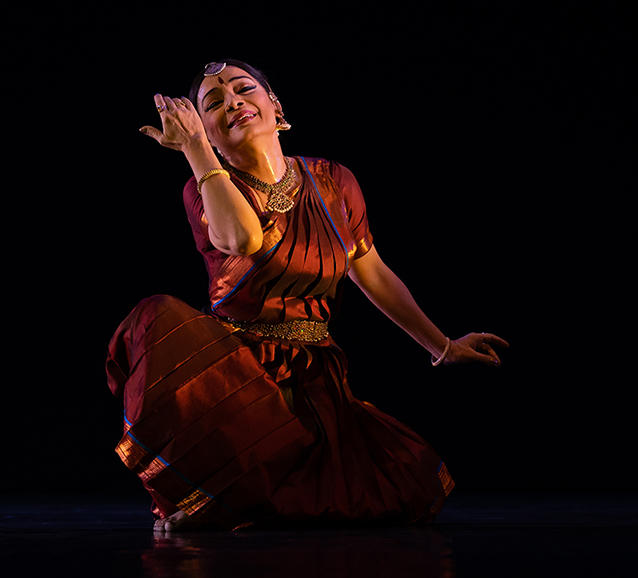Registered with the Registrar of Newspapers for India under R.N.I 53640/91
Vol. XXXII No. 22, March 1-15, 2023
Choreographing the Now — Malavika Sarukkai-Anubhandh — Connectedness
-- by Geeta Doctor
It is the most intimate of Malavika Sarukkai’s explorations in dance.
When she first appears on the vast darkened empty space at the Music Academy, it is stripped of the paraphernalia of the classical dancer’s repertoire. The musicians on a platform at one side had been rendered more effectively on a soundtrack. Even the invocatory image of the Doyen of Dance standing one foot raised from a garlanded pedestal at the side had been given leave of absence.
Sarrukai seemed isolated and completely alone. A glittering mote of dust, perhaps, reeling through time and place, a deer trapped in the headlights of civilizational decline.
Towards the end, the stage became a concentration camp with the brilliant choreographic inputs of her longtime collaborator Sumantra Ghosal using sound and lights to dramatic effect. The sudden explosion of crisscrossing Klieg lights from the four corners of the stage suggested the drama of the Covid era. People remained trapped in their homes, or worse in the blue lit aura of emergency rooms in hospitals accompanied by the mechanical sound of heart-lung machines. Voices chanting, chattering, seemed to spring from the darkness alternating between hope and despair.
“It was a time of isolation, loneliness and trepidation arising from the pandemic,” she explains in her note to her latest work. She has called it “Anubandh-Connectedness”. It suggests both a search that began within the four walls of her studio using her skills as a dancer to break down the barriers of what had been her armor against the world in telling the old familiar stories. In doing so, Sarukkai appears to strip bare the process that we as an audience take for granted and renews her tryst with dance. She had kept the stage bare. Her costume in deep red madder with hints of gold, the drapery flowing ever so lightly to accentuate the geometry of the dance, the accessories austere yet elegant, seemed to hint that the old imperatives of dance as a form of enchantment, were no longer relevant.
 Malavika Sarukkai. Photo credit: Sudeep Bhattacharya.
Malavika Sarukkai. Photo credit: Sudeep Bhattacharya.As she explains it in her introduction to her choreography of the five elements: “Anubhandh is a response to the world I live in. It seeks to recognise and reclaim our primordial relationships; with the Sun and Moon, as also the Five Great Elements (or the Pancha Mahabhutas as they are honored in India) – Prithvi-Earth, Aapah-Water, Agni-Fire, Vayu-Wind and Akasha-Space”.
What remained was an evening of pure joy. Of dance as an amalgam of beauty and precision with moments of sublime surrender to a heightened awareness of something beyond the present. At the same time as in some of the five segments, Sarrukai articulated the terror of war and the hatred engulfing us as in the flames of the Fire element to underline that we cannot remain in solitary confinement. Artists in particular have to evolve methods of creating those connections that define our common humanity. She seemed to have defied not just age and time, but gravity. The thillana in particular flowed like molten glass from a mystic glass blower working through space. All the components just flowed one into the other – perhaps due to Sumantra’s inputs, no doubt also with a fierce editing prowess.
If one had to single out two segments brimming with joy, it was perhaps the ones dealing with water and the gentle breezes that Sumantra Ghosal invokes the spirit of Kalidas in the words translated into a poem in English In the first one Sarukkai becomes a young girl again feeling the first showers of Monsoon rain upon the parched earth. The second one is best signalled by the words of the poem. “In the season of spring, stirred by the flower arrows of Kamadev, the God of Love, all nature is aroused. The cuckoo bird delirious on the juice of the mango blossom kisses its mate.” The traditions of classical norms are still in place.
Towards the final episode, one hears the tones of T.S.Eliot’s “Wasteland” in the repeated incantations of Shanthi, Shanthi, Shanthi and images of the idea of a primordial being, pure consciousness floating on a sea of nothingness.
Malavika Sarukkai invokes Sant Kabir in a moment of surrender. “The Lord is in me, the Lord is in you, just as prana ( life breath) is in the seed. “
She lifts the journey from the personal to the sublime.

